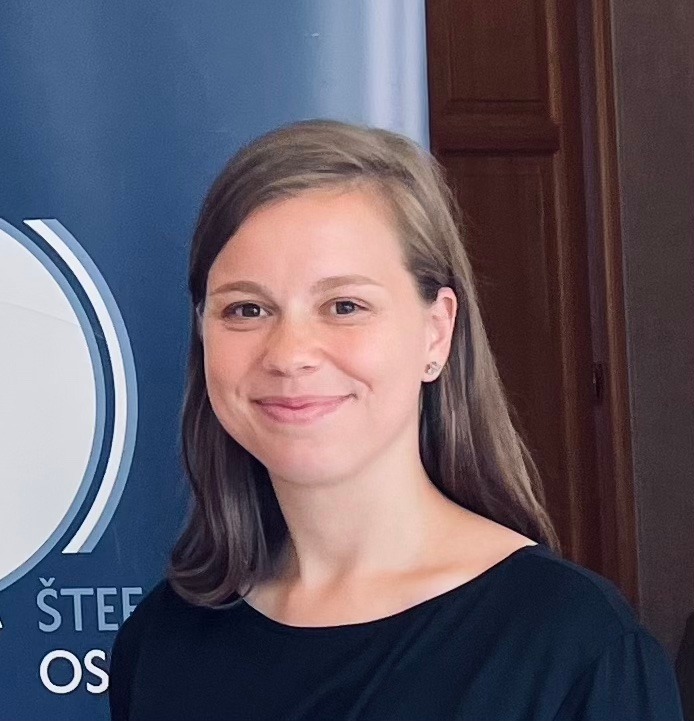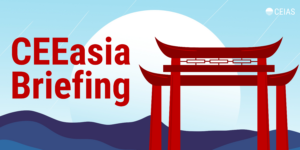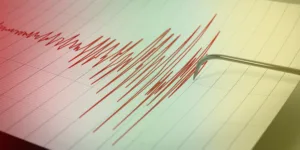Dear friends,
Welcome to the 57th issue of the CEEasia Briefing.
In this issue, we dissect the following topics:
- EU voted on import tariffs for China-made EVs
- Czech-Korean ties beyond nuclear energy
- Taiwan and Slovakia partner up on semiconductors research collaboration
- South Korea expands defense ties in Poland and Romania
- German Navy passes through the Taiwan strait
If you like what you see, please forward this message to your friends and colleagues who can subscribe here.
1. EU voted on import tariffs for China-made EVs
On October 4th, EU member states voted on imposing countervailing duties on China-produced electric vehicles (EVs).
With only five member states voting against the proposal, the European Commission received a greenlight to go ahead and start implementing the new tariffs.
Here is a breakdown of the vote by individual EU member states. Stay tuned for further analysis by our experts.
2. Czech-Korean ties beyond nuclear energy
What’s going on? In September, the Czech Republic and South Korea significantly advanced their bilateral relations through high-level visits. This seems to reflect a broader strategic alignment driven by shared security concerns over North Korea and Russia, as well as a mutual interest in nuclear energy, technological innovation, and economic collaboration.
Going deeper… A visit to South Korea by Czech Minister of Foreign Affairs Jan Lipavský came at the back of South Korean company KHNP’s project to build two units at the Dukovany nuclear power plant in Czech Republic, officially agreed in July. The largest energy initiative in Czechia’s modern history, valued at CZK 400 billion ($17.3 billion). This solidified South Korea’s position as Czechia’s key partner in advanced technology and its largest non-European investor, with both countries eager to expand cooperation across various sectors.
Shortly after… South Korean president Yoon Suk Yeol visited Czechia, meeting with Czech president Petr Pavel and prime minister Petr Fiala. This visit further broadened the scope of collaboration beyond nuclear energy, to transportation, industry, and science. The two nations signed 56 memorandums of understanding (MOUs) across a wide range of fields, including political and security cooperation, economic development, science and technology, and cultural exchange. A significant highlight of these discussions was the joint commitment to research initiatives in nuclear technology, AI, and medicine, with South Korea pledging approximately CZK 830 million ($37 million) over the next decade in joint research. Yoon also visited key industrial sites such as Doosan Škoda Power and Škoda JS in Pilsen. Later during the meeting in Prague, Lipavský with his Korean counterpart, Cho Tae-yul signed a MOU on cooperation in the reconstruction of Ukraine.
This means… South Korea’s ongoing dialogue with European partners, marked by its attendance at the NATO summit in July, highlights a growing alignment between like-minded democracies in Europe and the Indo-Pacific. The deepening ties between Czechia and South Korea are part of this broader cooperation, aimed at enhancing security and economic resilience amid evolving geopolitical challenges. South Korea’s active role in Ukraine’s reconstruction further underscores its commitment to bolstering Europe’s security architecture.
3. Taiwan and Slovakia partner up on semiconductors research
What’s going on? The Taipei Representative Office in Bratislava, represented the Head of the Office H.E. David Lee, signed new contracts with the Slovak University of Technology in Bratislava (STUBA) and the Institute of Electrical Engineering of the Slovak Academy of Science (IEE SAS) for the second year of semiconductor research collaboration. The partnership aims to establish cutting-edge semiconductor laboratories to train Slovakian researchers.
Going deeper… In September 2023, Slovakia and Taiwan signed the initial pact under which STUBA, SAS, and Taiwan’s Industrial Technology Research Institute (ITRI) will cooperate to set up a national semiconductor laboratory in Slovakia. The current contract is an extension of last year’s initiative and will be valid for four years. The partnership will establish two semiconductor laboratories and allows Slovak researchers to travel to Taiwan to undergo training at ITRI as well as complete technology transfers and licensing of semiconductor technologies. The project aims to develop inverter technology for electric vehicles, helping Slovakia blend into the semiconductor ecosystem and supply chain as well as expand ties between Europe-Taiwan semiconductor industries.
This means… Slovak-Taiwan ties grew closer since the Covid-19 pandemic up to late 2023. However, since the change of government in October 2023, the new administration seems to prioritize strengthening engagement with China. The last substantive exchange between Bratislava and Taipei was in June 2023, when Slovakia’s then-Deputy Minister of Economy Peter Svec led a delegation of officials and business representatives to attend the third round of the Taiwanese-Slovak Commission on Economic Cooperation and an investment forum in Taipei. Shortly after, Taiwan signed the initial cooperation agreement with STUBA and IEE SAS. Since then Slovakia-Taiwan ties included only a handful of engagements, mostly in cultural cooperation, such as setting up Taiwan Studies Center at the Comenius University in Bratislava, in September 2024.
4. German Navy crossed the Taiwan Strait for the first time in 22 years
What’s going on? The F125-class frigate Baden-Wuerttemberg (F222) and the Berlin-class replenishment oiler Frankfurt am Main (A1412) transited through the Taiwan Strait on 13-14 September; the first time since 2002 that German navy ships chose this rare route as a passage. At the same time, during the meeting to Beijing on 26th of September, China urged Germany to push for solutions against tariffs on EVs from China, which was realized in its vote against tariff on 4th of October.
Going deeper… The waterway between China and Taiwan is under tension, as China claims the strait as its own territory, and that any actions without permission in this area are a provocation to the sovereignty of China. Beijing stated that its troops will resolutely counter any threats and provocations, as PLA were monitoring and warning the German vessels. Meanwhile, German chancellor Olaf Scholz responded that the sea area is an international waterway, and there is no controversy in this action.
In the stark contrast to this move… Germany’s Chancellor Olaf Scholz and his Social Democratic Party were also the strongest voice against the duty over Chinese EVs, as China took up to one third of German car sales last year. The discussion of tariffs was raised over the concern that China is using official subsidies to lower the EV price within the EU, leading to its unfair advantage in the car market. With the EU’s tariff in practice, the German car industry is fearing retaliation measures from China, which is likely to further impact the worsening manufacturing; VW is already considering closing one of its factories in Germany, marking the first time in its 87 years history.
This means… The two incidents demonstrated the dilemma for the German stance vis-à-vis China, as it thrives to seek balance between its economic cooperation with China while routinizing its presence in the Indo-Pacific area. On the security level, the German Navy’s decision shows its willingness to defend freedom against China’s growing assertive actions in this area. It’s a symbolic move that presented Germany’s engagement with other western allies in this region. On the other hand, the German vote against the tariff on Chinese EV showed its economic interconnection with China is still immense. And that also explains the rather low profile of Germany’s government response to the naval voyage over Taiwan strait, as it still tried to maintain a friendly relationship with China for economic reasons despite the growing security challenges.
5. South Korea expands defense ties in Poland & Romania
What’s going on? South Korea’s top Army officer, General Park An-su, visited Poland and Romania to strengthen defense cooperation and expand arms industry ties. This aligns with President Yoon Suk-yeol’s push to make the defense industry a central focus of his administration.
Going deeper… During his nine-day trip, General Park An-su engaged in talks with Polish and Romanian military leaders, focusing on security and defense collaboration, particularly in light of Poland’s 2022 deals to purchase South Korean K2 tanks, K9 howitzers, and Chunmoo rocket launchers. In Romania, which marked the first official visit by South Korea’s highest-ranking Army officer, discussions centered on the $1 billion deal signed in 2023 for K9 howitzers and K10 resupply vehicles, as well as potential interest in further acquisitions. Romania’s purchase is especially significant as it represents the country’s first defense acquisition from a non-NATO nation, highlighting South Korea’s growing influence in global arms markets.
This means… The strengthening of defense ties between South Korea, Poland, and Romania reflects a broader strategy for South Korea to expand its footprint in the global arms market, particularly in Europe. And the increasing reliance on South Korean weaponry by both NATO and non-NATO countries suggest this could position South Korea as a key defense supplier.
Quick takes on CEEasia developments
TAIWAN | During the 7th US-EU Dialogue on China, the US and EU released a joint statement expressing support for Taiwan’s international participation. Marking a shift from previous statements, the document left out a reference to the ‘one China’ policy. It also emphasized the need for restraint in the Strait while rejecting any unilateral changes by force.
CHINA | Serbian police officers have been carrying out a one-month joint patrol mission at tourist attractions in the provinces of Hainan and Zhejiang, the first such joint patrol conducted in China. According to the Chinese Ministry of Public Security, the main aim is to deepen cooperation and enhance the safety of Serbian visitors in China.
CHINA | Maroš Šefčovič has been appointed as the new Commissioner for Trade and Economic Security. As a part of this appointment, Šefčovič will manage issues such as maintaining economic prosperity and resilience in the current geopolitical climate, managing EU-China trade as well as the broader de-risking agenda.
JAPAN | Rohto Pharmaceutical, a Japanese firm, formed a strategic partnership with Austria’s Sigmapharm Group to boost the production and distribution of ophthalmic medications and medical products in Europe. Rohto Pharmaceutical will invest €30 million and acquire a 51% stake in Sigmapharm’s parent company, enhancing its European market presence and Sigmapharm’s production capacity.
SOUTH KOREA | During the official visit from September 29th to October 1st, Slovak prime minister Robert Fico met with South Korean president Yoon Suk Yeol in Seoul, where they agreed to establish a strategic partnership. Both sides signed two memorandum of understanding focusing on trade and investment (TIPF) and on comprehensive energy cooperation, including carbon-free energy sources.
INDIA | India’s ammunition exports to Europe have been redirected to Ukraine for more than a year, led by transfers from the Czech Republic, Italy, and Slovenia. Although the amount of Indian artillery used by Ukraine constitutes only a negligible portion of Kyiv’s total arms imports, the Kremlin has raised the issue with Indian officials on various occasions. Despite maintaining warm relations with Moscow, India continues to engage with both sides.
INDIA | India’s External Affairs Minister S. Jaishankar visited Germany and Switzerland in September, discussing wide range of bilateral issues with local government representatives, including deepening of defense ties, trade and investments. Jaishankar also visited UN bodies headquartered in Geneva.












